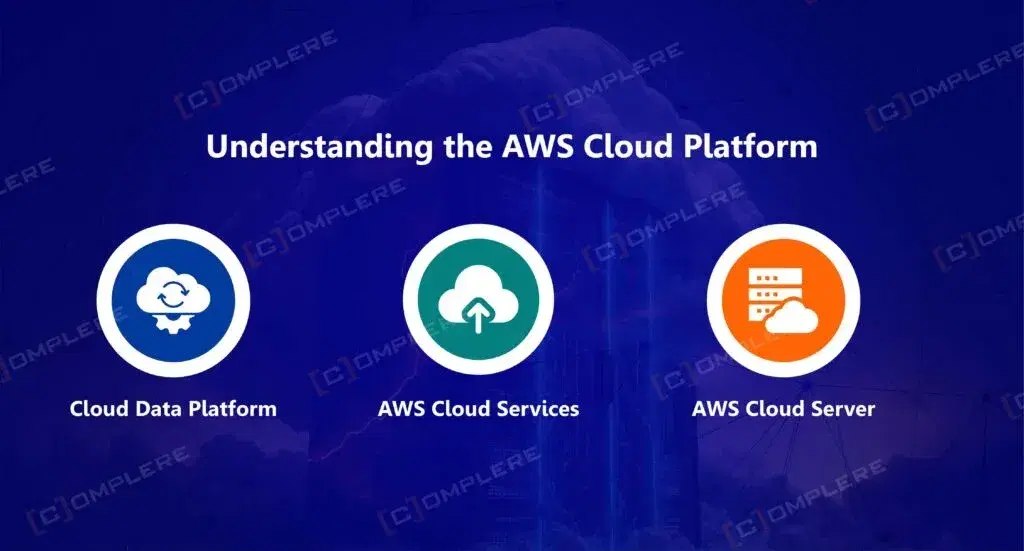Introduction
What is AWS Cloud Platform and Why is it Important?
6 Benefits of AWS Cloud Platform
1. Understanding the AWS Cloud Platform

- Cloud Data Platform: AWS provides scalable data storage solutions by allowing businesses to store, manage and process large amounts of information. The cloud data platform provides on-demand resources. These resources ensure businesses to only pay for what they use. This benefit makes it a cost-effective solution.
- AWS Cloud Services: AWS’s extensive suite of services includes Elastic Compute Cloud, which is also known as EC2 and Relational Database Service as RDS, and Simple Storage Service as S3, among others. These services support a wide range of operations that include from managing databases to hosting websites. It provides flexibility for businesses.
- AWS Cloud Server: AWS EC2 are known for providing virtual servers that can be deployed instantly by providing computing power for different types of applications. This gives a surety that businesses have the resources they require to run critical operations efficiently.
2. Scalability: A Key Advantage of AWS Cloud Platform

- Elastic Resources: AWS offers elastic resources that adjust according to fluctuating workloads. For example, AWS Lambda allows businesses to run code without provisioning servers. It automatically scales up or down based on demand.
- Auto-Scaling: AWS’s Auto-Scaling service allows businesses to set rules for adding or removing resources. This makes sure that your applications remain responsive during high traffic periods and save resources during slower times.
- Database Scalability: AWS offers database solutions, for example Amazon RDS, which automatically adjusts storage capacity based on demand. This eliminates the requirement for manual adjustments. This ensures flawless database management.
3. Flexibility: Staying Competitive with AWS

- Rapid Deployment: AWS allows rapid deployment of infrastructure by reducing the time it takes to launch new services. This helps businesses to adapt quickly to changing market conditions.
- Integration with AWS Databricks: AWS Databricks is a collaborative data analytics platform. These platforms integrate flawlessly with AWS. That allows real-time data processing and analytics. This also helps businesses to approach information faster. That supports real-time decision-making and improves flexibility.
- Flexibility for Innovation: AWS’s range of services offers flexibility. This increased flexibility allows businesses to experiment with new ideas and implement solutions effortlessly. Also, this makes AWS an ideal platform for innovation-based businesses.
4. Cloud Backup Services: Assurance of Business Continuity
- S3 Storage: Amazon S3 provides scalable and durable storage for backup data. It also delivers versioning capabilities. This amazing capability helps businesses to ensure that they can recover data from differed points in time.
- Data Encryption: AWS encrypts data both in transit and at rest. It protects your sensitive information from breaches. This protection assures business continuity and builds customer trust effectively.
- Backup and Restore: AWS Backup automates data backup processes across different services. It provides scheduled backups. Also, it provides critical data that is preserved and recoverable in case of disaster.
5. Case Study: AWS Cloud Platform in Action
- Scalability: AWS’s elastic resources allowed the company to manage surges in traffic during trading hours, preventing downtime and ensuring smooth user experiences.
- Flexibility: The company utilized AWS Databricks to avail real-time information into market trends. This capability allows real-time decision-making and maintaining a competitive reputation.
- Secure Backup: AWS Backup gives a reliable assurance about your business’s data was securely backed up. Also, it protects client information and ensures business continuity.
6. Best Practices for Implementing AWS Cloud Platform
- Define Objectives: Implement clear goals for your cloud infrastructure. This will guide your configuration of AWS services to align with your business requirements.
- Leverage Training Resources: AWS offers comprehensive training resources. Make sure your team uses these materials to approach the platform’s full capabilities.
- Optimize Resources: Monitor and adjust resource allocation regularly to optimize AWS cloud costs. This optimization supports efficient cloud spending and avoids over-provisioning.
- Stay Secure: Regularly evaluate security measures to protect your cloud infrastructure. Implement encryption, backups and access controls to secure all your sensitive information.
Key Benefits of AWS Cloud Platform:
- Scalable Infrastructure - Businesses can easily scale up or down based on demand without investing in expensive hardware or worrying about capacity limits
- Flexible Adaptation - Companies can quickly adjust their IT resources to meet changing market conditions and business requirements
- Enterprise Security - Advanced security measures and compliance standards protect critical business data and customer information from threats
- Complete Solution Suite - Comprehensive range of services covering everything from basic storage to advanced AI. This makes it a one-stop platform for digital transformation.














